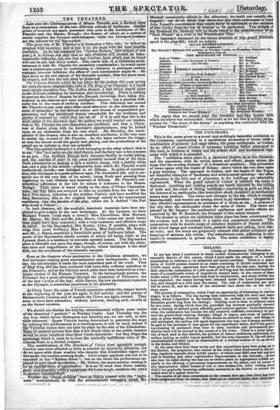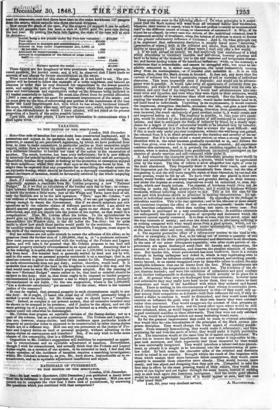IRELAND.
County of Roscommon, 23d December.
In my last letter I mentioned in detail certain circumstances belonging to an extensive district of this county, which I have made the subject of a careful examination in reference to its industrial and social condition. There is a popu- lation of 10,000 persons located on an estate consisting of 30,000 cultivated and 12,000 waste acres: operations have been going on for the last year, having for their object the reclamation of 1,300 acres of turf-bog and the incidental improve- ment of a considerable extent of imperfectly drained land; in the course of these works about 1,000 persons have been kept in employment, and about 8,0001. has been expended; the money having been obtained under the Land Improvement Act, and charged as a debt upon the estate. The cost of reclamation per acre will be about 61., and the value of the reclaimed land about 10s. at the end of three years. The process of reclamation, which I had an opportunity of witnessing in various stages, is as follows. The bog having been intersected with the main and lesser drains, which I described in my former letter, its surface is covered with the limestone gravel dug from the cuttings. Nothing more is done in ordinary cases for two years, during which time the gravelled bog becomes gradually covered with a coating of natural grass, affording good summerpasture. In the third year, when the substratum has become dry and acquired sufficient consistency to pre- vent the gravel from running through, tillage is begun, and crops of potatoes, oats, or green feeding, obtained. If the drains be allowed to close, and tillage be still attempted, the surface will again degenerate into bog; but if proper attention be paid to the provision of free egress for the superfluous water, and if the gravel top-dressing be continued from time to time, excellent and permanently pro- ductive land will be created in the course of a few years. There is a great quan- tity of such land in this district, the product of former reclaiming operations, the surface looking as unlike bog as possible, but the true character of the soil being unmistakeably evident upon an examination of a vertical section of it, as shown in the drains and ditches.
At the same time that these works and this expenditure have been going on in the district, the proprietor, who resides on his estate when Parliament is not sit- ting, regularly expends about 4,0001. yearly; of which sum 8381. was laid out last year in draining and other reproductive improvements in his demesne. It has also been his habit during the last ten or twelve years to appropriate 1,0001. an- nually to the effecting of permanent improvements on the estate, and by means of this appropriation slated houses of one or two stories (the latter costing about 2501.) are gradually becoming sufficiently numerous in the district to attract the notice even of a casual observer.
The results of all these antecedents at the present time are, that there has been little emigration from the estate; that tinfoil:wig deserted lands; that there have been no clearancess, and that thenrhave been in the union workhouse 137 paupers
from the estate, which extends into three electoral divisions.-
les.ti tri■ Now comes the pinch of the case. For the support (if support it can be called) of these 137 masce,there has been a sum of 4,0001. paid for poor-rate during the last year. -BY -Patting the facts into figures, the state of the case will at once be obvious- ItenatCbeIng a few pounds under the Poor-law valuation . • . £16,000- CIE Poor-rate £4,000 1 AD.
Expenditure In demesne and establishment 4,000 Interest on loan under Improvement Act, 8,0001. at 6} per cent 520 . isiqs141. Allocated for improvements 1,000 Arrears in consequence of the failure of crops (about half) 8,000 17,520 -.
Balance against the rental £1,520- These figures are not imaginary or even proximate estimates, but express, in round numbers, the correct sums; and it will be observed that I have made no account of any charge for former encumbrances on the estate.
What must be the end of this state of things it is not hard to see. The pro- prietor will be forced to follow the example of a noble neighbour, and become an absentee in order that he may diminish his expenditure to the lowest possible scale, and escape the pain of observing the misery which that expenditure (the alms and benevolences and reproductive outlay on the demesne being included in it) Waded materially to lighten. He must also divert from its present allocation 1,0001. a year, at present set apart for permanent improvement of the estate; and he must give up the idea of reborrowing any portion of the instalments of the loan tinder the Land Improvement Act, with which he has already burdened himself. He must, however, come what may, still pay the poor-rate; which, under the opera- tion of the retrenchments to which I have alluded, will not stand at its present proportion of a fourth of the entire possible income.
Upon this, and other points, I have more information to communicate when I



























 Previous page
Previous page